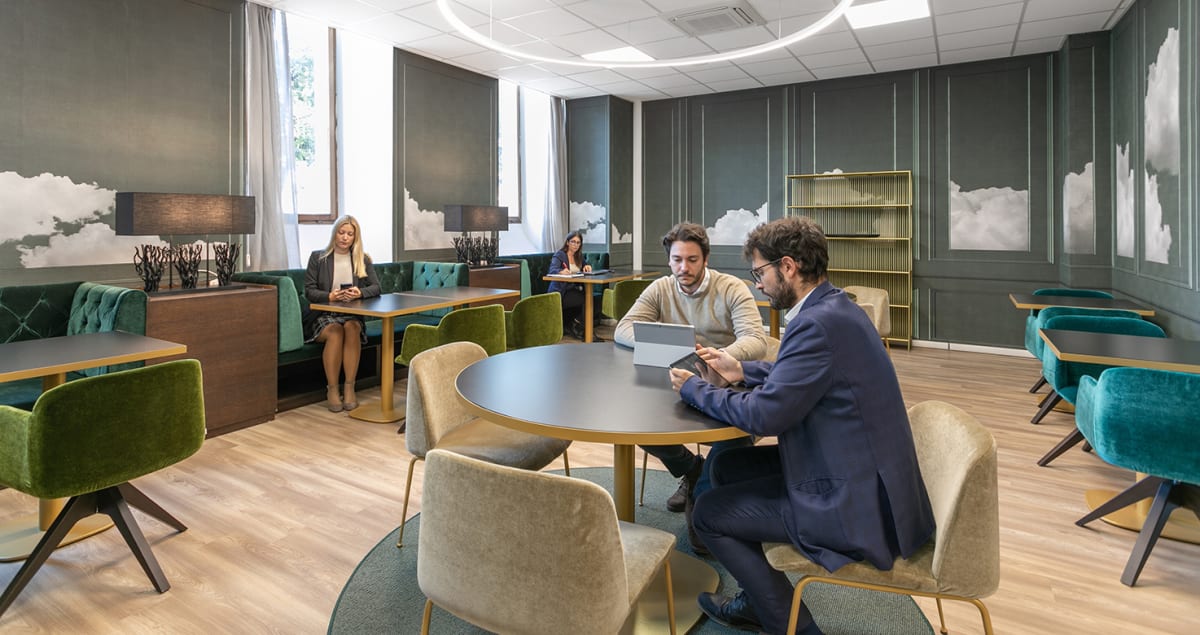The pandemic has been a catalyst for the hybrid working boom, with the widespread adoption of the model empowering professionals to split their time between home, the HQ – and a local flexspace.
Growing demand for flexible working, boosted by the effects of the Covid-19 pandemic, has led to increasing numbers of companies adopting the hybrid work model, giving their employees greater freedom over how and where they work. The traditional 9-5 spent in a central office, five days a week, is out and the hybrid model is very much in.
“Multiple studies have shown that businesses of all sizes are planning for a hybrid future,” says IWG Founder and CEO Mark Dixon. “In fact, our own research of the FTSE 100 and FTSE 250 has shown that three times the number of listed businesses are looking to use a hybrid model, compared to those looking to carry on in the same way as pre-pandemic.”
Flexible workspaces are playing a major part in that future. According to a 2019 study from JLL, flexspace was predicted to make up 30% of all office space by 2030 but, based on the uptake of hybrid working during the pandemic, this figure will likely be much higher. Demand across IWG markets has consistently been up month-on-month throughout the course of 2021.
That growth has caught the attention of investors, with flexible workspace now being considered as the leading option for franchise investment. IWG saw a staggering 350 per cent rise in the number of committed franchise locations in the first half of 2021.
And in the third quarter, signed agreements across six new countries with a total of 102 committed locations.
It’s been a truly global success story, demonstrating the strength of the hybrid revolution. In the USA, franchise deals will see a total of seven IWG flexspaces open in Detroit and a further five open in Ohio and Indiana. In India, IWG has joined forces with real estate leasing and coworking company Conjoinix to open 18 centres across Delhi-NCR, Haryana, Uttar Pradesh, Jammu, Kashmir and Gujarat. Three new centres will also open in the Malaysian coastal city of Melaka.
Meanwhile, in Bangkok, Jugkarut Ruangratanakorn – CEO of leading real-estate business Ratanakorn Asset – signed a master franchise agreement with IWG in July 2021, to meet rising demand for workspace close to people’s homes. In total, the tie-up will deliver 40 centres - IWG’s largest deal to date - with the overall aim to open an IWG location in every regional city in Thailand. The first phase will see the debut of five sites by the end of 2022, with two in Pattaya, and one apiece in Chonburi, Siracha and Rayong.
In the UK, new franchise partners are tapping into the trend for businesses downsizing central HQs and giving employees access to more regional bases nearer to their homes. Earlier this year James Wright from WG1 Offices Limited signed one of IWG’s ‘franchise cluster agreements’ focusing on London’s residential areas. He agreed to open five new centres over the next four years in North and East London including Camden, Highbury & Islington and Bethnal Green.
IWG has also recently signed a franchise agreement with the Ashley Group that will help ex-commuters from North London and Hertfordshire work closer to home. The deal will see five new IWG centres open across the North London boroughs of Enfield and Barnet, along with Hertfordshire, over the next four years.
Meanwhile, Dixon anticipates that growth will continue and believes the change in working culture is “irreversible”. Franchise partnerships will continue to play an important role in building on that success as we enter 2022.
“At IWG, we are aiming to expand our network, mostly by franchise, to provide a flexible workspace in every village, town and city,” Dixon explains. “The future of work is already with us, and it’s only going to improve.”
Are you ready to meet the demand for flexible office space in 2022? Find out more about IWG’s franchising partnerships today.






